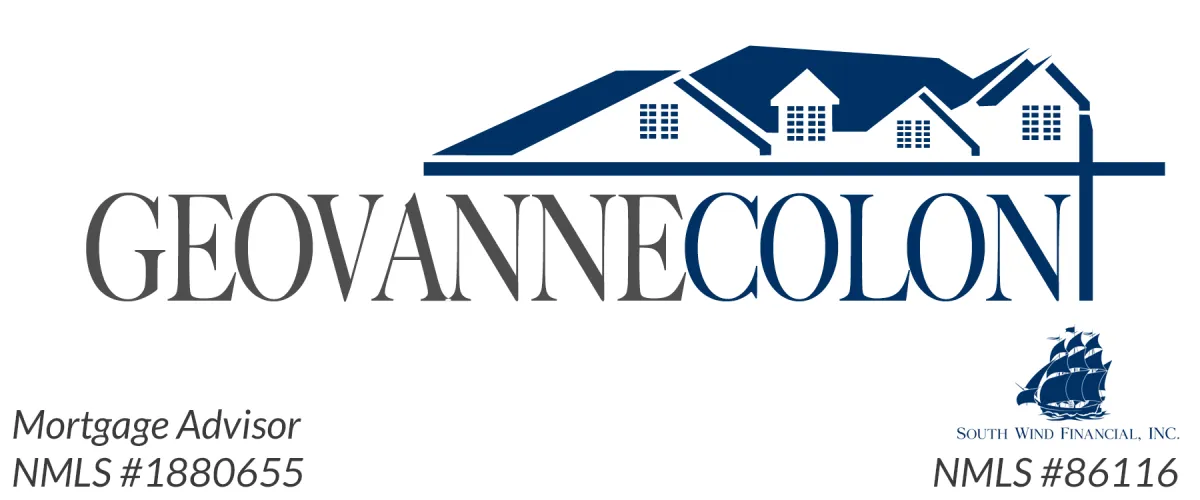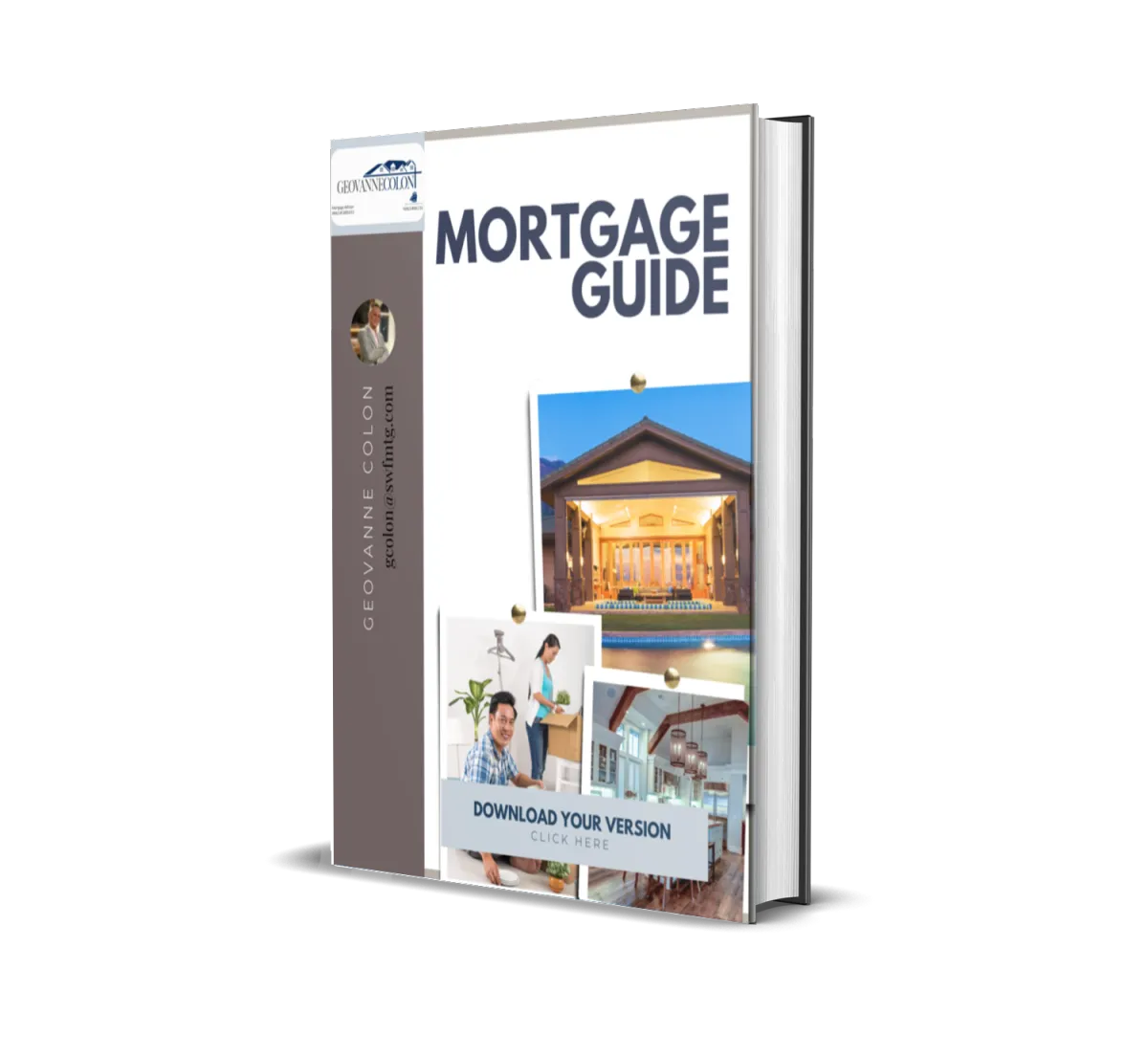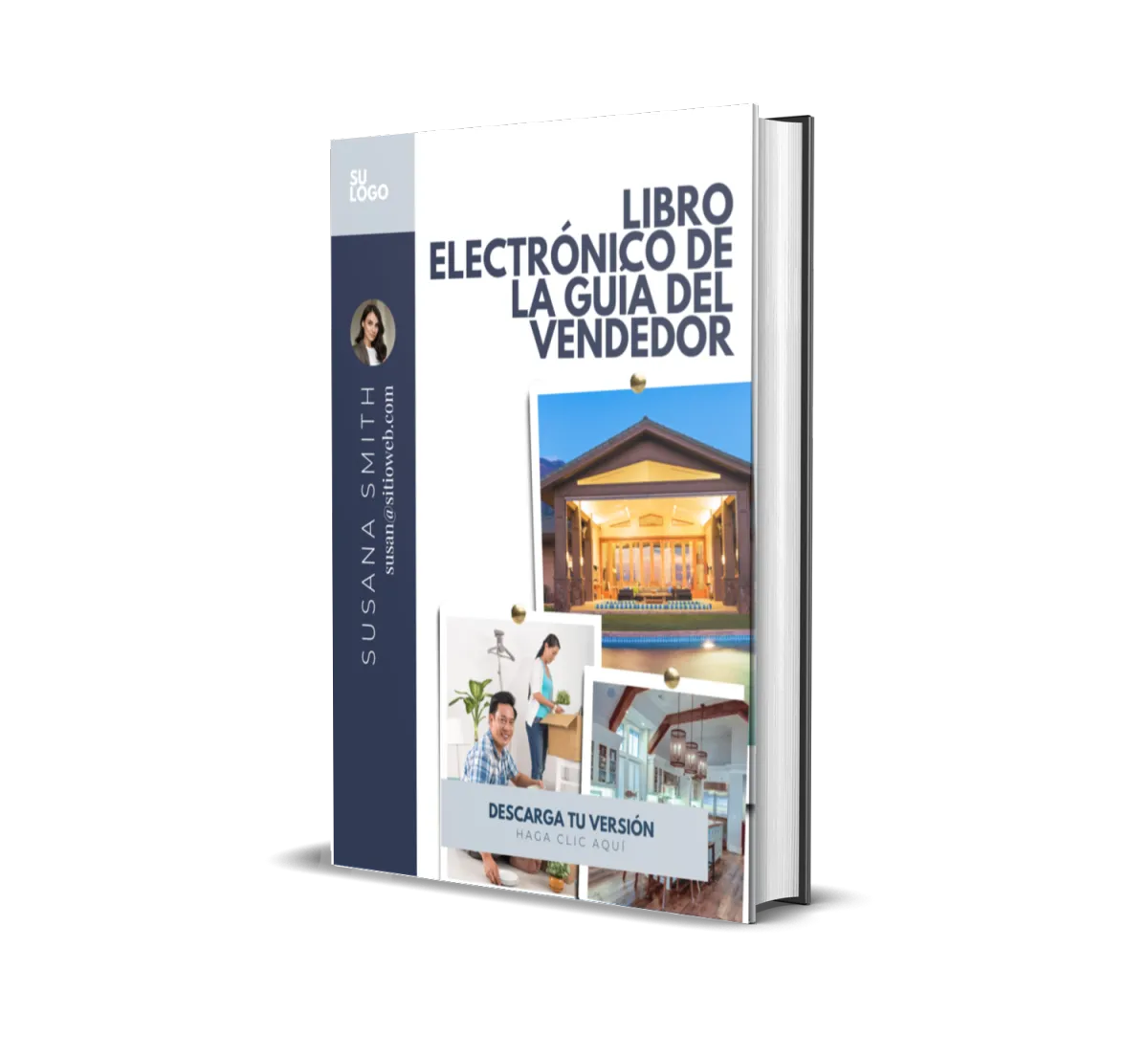617-821-1757

Looking For FHA Loans?
Apply today for the mortgage
that’s right for you.
Unlock Low Rates with Ease
Discover how Geovanne Colon simplifies the mortgage qualification process for you.
Apply today for the mortgage
that’s right for you.
Unlock Low Rates with Ease
Discover how Geovanne Colon simplifies the mortgage qualification process for you.
Low Rate.
Zero Hassles.
Get a free quote
Low Rate.
Zero Hassles.
Get a free quote
Feel Overwhelmed by Mortgage Choices? I Understand.

Feeling Lost in a Sea of Mortgage Options? Finding the right mortgage can be a daunting task. With an overwhelming array of rates, terms, and lenders, it's easy to feel lost and uncertain. Are you worried about high interest rates, hidden fees, or choosing a mortgage that doesn't fit your long-term goals?
Why Choose Us?
Ready to Start?
Your perfect home won't wait forever, and neither should you. Begin your journey today with a loan officer that puts you first. By choosing us, you're not just getting a loan – you're gaining a lifelong partner in all your mortgage endeavors.
Start your no-obligation consultation now and join the myriad of satisfied homeowners who have unlocked the doors to their future with ease and confidence. Dive into our world of simplified lending, and let's turn your homeownership dreams into reality.
Welcome Home!
Loan Programs We Help With
Seamless Solutions, Limitless Possibilities
Residential Mortgage Programs
1. FHA Loans
Federal Housing Administration (FHA) Loans
• Suitable for first-time homebuyers
• Low down payment options (as low as 3.5%)
• Requires mortgage insurance
• Lenient credit scores accepted
• 203K Renovation Loans Available
2. Conventional Loans
Conventional Mortgage Loans
• Preferred by borrowers with stronger credit
• Down payments as low as 3%
• Available in fixed or adjustable rates
• No government insurance premiums
• HomeStyle Renovation Loan Available
3. USDA Loans
US Department of Agriculture (USDA) Loans
• Ideal for eligible rural and suburban homebuyers
• Zero down payment
• Low insurance costs
• Income and geographic restrictions apply
4. VA Loans
Veterans Affairs (VA) Mortgage Loans
• Exclusively for veterans, active-duty service members, and eligible spouses
• No down payment required
• No mortgage insurance needed
• Competitive interest rates
A. ITIN - No Social Security Loans
• For borrowers with an Individual Tax Identification Number
• Lacks Social Security number
B. 1099 Loans
• Designed for independent contractors or self-employed individuals
• Based on the 1099 tax form income
C. VOE Only
• Verification of employment as the primary source of income validation
D. Asset Depletion
• Utilizes borrower's liquid assets for qualification purposes
E. Bank Statement Loans
• Income based on bank statements, suitable for self-employed borrowers
F. DSCR - Investor No Income Verification
• For real estate investors, using property cash flow as a qualification metric
Non-Qualified Mortgage (Non-QM) Loans
Loan Programs We Help With
Seamless Solutions, Limitless Possibilities
Residential Mortgage Programs
1. FHA Loans
Federal Housing Administration (FHA) Loans
• Suitable for first-time homebuyers
• Low down payment options (as low as 3.5%)
• Requires mortgage insurance
• Lenient credit scores accepted
2. Conventional Loans
Conventional Mortgage Loans
• Preferred by borrowers with stronger credit
• Down payments as low as 3%
• Available in fixed or adjustable rates
• No government insurance premiums
3. USDA Loans
US Department of Agriculture (USDA) Loans
• Ideal for eligible rural and suburban homebuyers
• Zero down payment
• Low insurance costs
• Income and geographic restrictions apply
4. VA Loans
Veterans Affairs (VA) Loans
• Exclusively for veterans, active-duty service members, and eligible spouses
• No down payment required
• No mortgage insurance needed
• Competitive interest rates
Non-Qualified Mortgage (Non-QM) Loans
A. ITIN - No Social Security Loans
• For borrowers with an Individual Tax Identification Number
• Lacks Social Security number
B. 1099 Loans
• Designed for independent contractors or self-employed individuals
• Based on the 1099 tax form income
C. VOE Only
• Verification of employment as the primary source of income validation
D. Asset Depletion
• Utilizes borrower's liquid assets for qualification purposes
E. Bank Statement Loans
• Income based on bank statements, suitable for self-employed borrowers
F. DSCR - Investor No Income Verification
• For real estate investors, using property cash flow as a qualification metric
More Loan Programs
Foreign National Loans
• Tailored for non-U.S. citizens looking to buy investment or vacation properties in the U.S.
• May require larger down payments and proof of foreign income.
Jumbo Loans
• Exceed the loan limits set by the FHFA for conventional mortgages.
• Requires non-traditional underwriting to accommodate the larger loan amount.
Real Estate Investor Loans
• Customized loans for experienced real estate investors.
• Can include options for multiple properties under a single loan (blanket loans).
Non-Warrantable Condo Loans
• For condos that do not meet specific requirements by Fannie Mae or Freddie Mac.
• Necessary for financing condos in buildings with more owner-occupied spaces or litigation issues.
Credit Event Loans
• Available to borrowers with significant derogatory credit events, such as bankruptcy or foreclosure.
• Typically requires a higher down payment or additional reserves.
Hard Money/Private Lending
•For immediate or short-term financing needs
• Higher-cost, short-term loans
• Asset-based lending criteria
• Terms typically around 12 months
Fix and Flips
• Loans crafted for renovating and flipping properties
Commercial Loans
•Tailored for businesses to purchase or refinance commercial property
• Offering solutions for office buildings, retail spaces, and industrial properties
• Custom terms to align with business strategies
New Construction
• Financing for ground-up construction projects
Small Business Administration (SBA) Loans
• Federally backed to help start or grow a business
• Lower down payments
• Longer repayment terms
• Focused on small businesses
Bridge Loans
• Short-term loans to bridge the gap during transitional periods
Down Payment Assistance Programs
• Provides prospective homebuyers with loans or grants that they can use toward the down payment for a house.
• Most down payment assistance programs are designed for first-time homebuyers and offered by various institutions, such as government, non-profits, or lenders.
More Loan Programs
Foreign National Loans
• Tailored for non-U.S. citizens looking to buy investment or vacation properties in the U.S.
• May require larger down payments and proof of foreign income.
Jumbo Loans
• Exceed the loan limits set by the FHFA for conventional mortgages.
• Requires non-traditional underwriting to accommodate the larger loan amount.
Real Estate Investor Loans
• Customized loans for experienced real estate investors.
• Can include options for multiple properties under a single loan (blanket loans).
Non-Warrantable Condo Loans
• For condos that do not meet specific requirements by Fannie Mae or Freddie Mac.
• Necessary for financing condos in buildings with more owner-occupied spaces or litigation issues.
Credit Event Loans
• Available to borrowers with significant derogatory credit events, such as bankruptcy or foreclosure.
• Typically requires a higher down payment or additional reserves.
Hard Money/Private Lending
•For immediate or short-term financing needs
• Higher-cost, short-term loans
• Asset-based lending criteria
• Terms typically around 12 months
Fix and Flips
• Loans crafted for renovating and flipping properties
Commercial Loans
•Tailored for businesses to purchase or refinance commercial property
• Offering solutions for office buildings, retail spaces, and industrial properties
• Custom terms to align with business strategies
New Construction
• Financing for ground-up construction projects
Small Business Administration (SBA) Loans
• Federally backed to help start or grow a business
• Lower down payments
• Longer repayment terms
• Focused on small businesses
Bridge Loans
• Short-term loans to bridge the gap during transitional periods
Down Payment Assistance Programs
• Provides prospective homebuyers with loans or grants that they can use toward the down payment for a house.
• Most down payment assistance programs are designed for first-time homebuyers and offered by various institutions, such as government, non-profits, or lenders.
Who We Help?
Seamless Solutions, Limitless Possibilities
First Time Home Buyers
We know how overwhelming the process of buying a home is, especially if it is the first time that you're doing it. We will work closely with you to explain the process, to protect you from making mistakes that could cost you later, and to ensure that your mortgage gets approved and you get the home that you are so excited to be buying!
Move Up and Second Home Buyers
Buying a new home when you currently own one has it's own unique set of concerns. We can answer all of your questions about how to qualify and purchase a home when you already own one whether you're buying a new primary residence or a second vacation home.
Refinancing Home Owners
If you already own your home but you are looking to refinance to either save money with a lower interest rate or possibly take some cash out for any reason, we can help you with that. We also can show you how to make sure you are structuring your new financing to get the best deal possible.
Investment Buyers
If you're buying real estate for investment purposes, we can help you secure low rate financing to maximize your ROI.
Seniors Seeking Reverse Mortgages
If you are 62 years or older and are looking for options to stay in your home without a mortgage payment or to access your home's equity while still living there, I can answer your questions about reverse mortgages so you can decide if they are right for you.
What My Clients Say
Ready to Find Your Perfect Mortgage?
Are You A First Time Home Buyer?
Download Our Free Home Buyer's Guide

Other Resources You'll Find Helpful

Buyer's Guide for Real Estate Agent
(English)

Buyer's Guide for Real Estate Agent
(Spanish)

Seller's Guide for Real Estate Agent
(English)

Seller's Guide for Real Estate Agent
(Spanish)
Calculate Your Mortgage Payment
Our Blogs

Maximizing Your Airbnb Potential: Mortgage Tips, Lenders, and Airbnb Loans
Maximizing Your Airbnb Potential: Mortgage Tips, Lenders, and Airbnb Loans
Airbnb has revolutionized the way people travel and find accommodations, opening up opportunities for property owners to earn rental income. When considering investing in Airbnb properties, understanding the intricacies of mortgages, lenders, and financing options is crucial for success. There are a few key factors to consider when financing an Airbnb property:
1. Down payment: Lenders typically require a larger down payment for investment properties compared to primary residences. The down payment for an Airbnb property is typically around 20-25% of the purchase price.
2. Interest rates: Interest rates for investment properties are usually higher than for primary residences. It's important to shop around and compare rates from different lenders to ensure you're getting the best deal.
3. Loan options: There are various loan options available for financing an Airbnb property, including conventional loans, FHA loans, and portfolio loans. Each option has its own requirements and benefits, so it's important to research and understand all your options before making a decision.
4. Rental income: Lenders will typically consider the potential rental income from the Airbnb property when determining your loan eligibility. They may require you to provide documentation of your rental income, such as rental agreements or financial statements.
5. Property management: Some lenders may require you to work with a professional property management company to manage your Airbnb property. This can help ensure that the property is well-maintained and rented out consistently, which can help increase your chances of loan approval.
Overall, financing an Airbnb property can be a complex process, but with careful research and planning, it can be a profitable investment opportunity. It's important to work with experienced professionals, such as real estate agents and lenders, to help navigate the process and ensure success.
Understanding Airbnb Mortgages
Understanding Airbnb Mortgages can be a crucial step in successfully managing an airbnb property. When considering ways to finance an Airbnb, it's important to understand the different airbnb financing options available. One option is to take out a short-term rental loan specifically designed for funding an Airbnb property. Another option is to use the short-term rental income generated from the property to help with funding for an Airbnb. Additionally, some homeowners choose to take out a home mortgage on their primary residence in order to buy a property to use on Airbnb. It's crucial to consider factors such as the mortgage rate and type of financing when deciding how to finance an Airbnb. One can find a guide to financing an Airbnb on the Airbnb website or consult with a mortgage provider for more information.
When considering taking out a mortgage for a primary residence to use on Airbnb, one must also keep in mind the potential risks involved. It's important to carefully review the terms of any short-term loans or home equity involved in the financing process. By fully understanding the terms and conditions of the short-term rental financing, homeowners can make informed decisions about how to use their Airbnb. Ultimately, utilizing an Airbnb property as a home or investment can be a rewarding venture, but it's important to carefully consider all mortgage and financing options before proceeding.
Types of Mortgages Suitable for Airbnb Properties
When looking to finance an Airbnb property, borrowers can explore various mortgage options tailored for short-term rental investments. These may include specialized loans or conventional mortgages that accommodate the unique needs of Airbnb hosts.
Factors Lenders Consider for Airbnb Mortgages
Lenders assessing Airbnb mortgage applications typically evaluate factors such as the borrower's creditworthiness, rental income potential, and property location. Demonstrating a solid financial standing and a viable Airbnb business plan can strengthen your chances of securing favorable loan terms.
Comparing Traditional Mortgages to Airbnb Mortgages
Unlike traditional mortgages for primary residences, Airbnb mortgages consider the property's income-generating potential. This can influence interest rates, down payment requirements, and eligibility criteria, making it essential to understand the differences before committing to a loan.
Choosing the Right Lender for Your Airbnb Property
When looking for funding for an Airbnb property, there are a few things you need to keep in mind. Borrowing money to use the Airbnb platform can be different from a traditional residential mortgage on your primary home. You may need to consider getting an Airbnb loan to buy another investment property or use the equity in your primary home to finance your Airbnb venture. These loans are based on the potential rental income generated from the property on Airbnb or VRBO, and usually come with higher interest rates and requiring a higher down payment or making a larger down payment. It's important to choose the right lender who understands your investment strategies and can offer coverage ratio loans that fit your needs.
With the rise in popularity of renting out properties on platforms like Airbnb, finding the right lender for your Airbnb property is crucial. Whether it's funding for an Airbnb property or using home equity to finance your venture, it's important to work with a lender who specializes in these types of loans. When considering a loan for your Airbnb property, be sure to compare interest rates, terms, and requirements to find the best fit for your investment goals.
When evaluating lenders for Airbnb financing, factors such as interest rates, loan terms, and customer service are paramount. Selecting a lender experienced in catering to Airbnb hosts can provide valuable insights and streamline the borrowing process.
Several mortgage companies specialize in financing Airbnb properties, offering tailored loan products to suit the unique needs of short-term rental investors. Researching and comparing offerings from reputed lenders can help you find the best fit for your Airbnb venture.
How to Evaluate Airbnb Loan Offers from Different Lenders
Comparing loan offers from various lenders involves analyzing aspects like interest rates, fees, repayment terms, and flexibility. Understanding the total cost of borrowing and the impact on your rental income is crucial for making an informed decision.
Optimizing Rental Income with Airbnb Financing
Innovative Financing Solutions for Airbnb Hosts
Exploring innovative financing options tailored for Airbnb hosts can enhance your rental income potential and expand your property portfolio. These solutions may include home equity loans, hard money loans, or specialized Airbnb financing programs.
Utilizing Home Equity Loans to Fund Airbnb Ventures
For established Airbnb hosts with equity in their primary residence, tapping into home equity through loans can provide capital for acquiring new Airbnb properties or renovating existing listings. Careful financial planning is essential to maximize the benefits of this financing method.
Acquiring Hard Money Loans for Airbnb Property Purchases
Hard money loans offer a swift financing option for purchasing Airbnb properties, especially for borrowers with unconventional income sources or credit challenges. While interest rates may be higher, the quick approval and funding process can expedite your property investment goals.
Strategies for Successful Short-Term Rental Investments
Key Differences Between Traditional Rentals and Airbnb Properties
Understanding the distinctions between managing traditional long-term rentals and Airbnb properties is crucial for optimizing profitability. Factors such as occupancy rates, maintenance costs, guest reviews, and marketing strategies vary significantly in the short-term rental market. Here are some key differences between managing traditional long-term rentals and Airbnb properties:
1. Occupancy Rates: With long-term rentals, landlords typically aim for consistently high occupancy rates by securing long-term leases with tenants. In contrast, Airbnb properties rely on short-term bookings, which can lead to fluctuating occupancy rates throughout the year. Managing the booking calendar and optimizing pricing strategies are essential for maximizing occupancy rates in the short-term rental market.
2. Maintenance Costs: Maintenance costs for Airbnb properties can be higher compared to long-term rentals, as short-term guests may result in increased wear and tear on the property. Regular cleaning, restocking essentials, and addressing guest complaints promptly are all key aspects of maintaining a successful short-term rental property.
3. Guest Reviews: Guest reviews play a crucial role in the success of Airbnb properties, as they directly impact a property's ranking and visibility on the platform. Providing exceptional guest experiences and promptly addressing any issues that may arise are essential for accumulating positive reviews and attracting more bookings.
4. Marketing Strategies: Marketing strategies for traditional long-term rentals often involve listing the property on rental websites and working with real estate agents to find long-term tenants. In contrast, marketing strategies for Airbnb properties require a strong online presence, high-quality photos, and effective use of keywords to attract potential guests on the platform.
By understanding and adapting to these differences, property managers can make informed decisions to optimize profitability for both traditional long-term rentals and Airbnb properties.
Maximizing Profitability as an Airbnb Host
To maximize rental income as an Airbnb host, focusing on factors like pricing strategy, property amenities, guest experience, and listing visibility is essential. Implementing effective marketing techniques and maintaining high-quality standards can attract more guests and drive positive reviews. Here are a few key strategies to consider:
1. Pricing Strategy: Keep an eye on market trends and adjust your pricing accordingly. Consider offering discounts for longer stays or special promotions during slower booking periods. Utilize dynamic pricing tools to optimize rates based on demand and competition.
2. Property Amenities: Provide guests with the amenities they expect, such as high-speed Wi-Fi, fully equipped kitchens, comfortable furnishings, and essential toiletries. Consider adding extra touches like welcome baskets, local guidebooks, or complimentary snacks to enhance the guest experience.
3. Guest Experience: Prioritize guest satisfaction by maintaining clear communication, promptly addressing any issues or concerns, and providing a seamless check-in/check-out process. Encourage guests to leave positive reviews by exceeding their expectations and highlighting the unique features of your property.
4. Listing Visibility: Use high-quality photos, detailed descriptions, and compelling headlines to make your listing stand out. Invest in professional staging and photography services to showcase your property in the best light. Optimize your listing for search engines by using relevant keywords and updating your calendar regularly.
5. Marketing Techniques: Utilize social media, email marketing, and online advertising to reach a wider audience and attract potential guests. Collaborate with local businesses, influencers, or tourism boards to promote your Airbnb rental and take advantage of word-of-mouth referrals.
By focusing on these key factors, Airbnb hosts can maximize their rental income and create a memorable experience for guests, ultimately leading to repeat bookings and positive reviews.
Navigating Short-Term Rental Regulations and Laws
Compliance with local regulations, zoning laws, and tax requirements is integral to managing Airbnb properties legally and responsibly. Staying informed about evolving short-term rental laws and maintaining transparent communication with guests can help mitigate risks and ensure a smooth operation.
Exploring Mortgage Options for Airbnb Businesses
Specialized Mortgage Products for Airbnb Rentals
Specialized mortgage products tailored for purchase an investments property Airbnb rentals offer features that align with the cash flow patterns and revenue streams of short-term rental properties. These loans may provide flexibility in payment schedules or accommodate seasonal income fluctuations common in the Airbnb industry. One common feature of specialized Airbnb rental mortgages is the ability to use the property's rental income to qualify for the loan. This can be especially beneficial for borrowers who rely on rental income to cover mortgage payments. Lenders may use a percentage of the property's rental income to determine the borrower's debt-to-income ratio, making it easier for Airbnb hosts to qualify for a mortgage.
Another key feature of these specialized loans is the option for interest-only payments during the first few years of the loan term. This can help Airbnb hosts manage their cash flow as they navigate the ups and downs of the short-term rental market. Additionally, some lenders may offer adjustable-rate mortgages (ARMs) with lower initial interest rates, providing borrowers with lower monthly payments in the early years of the loan.
In addition to flexible payment options, specialized Airbnb rental mortgages may also offer higher loan-to-value ratios than traditional mortgages. This can be advantageous for borrowers who may not have a large down payment saved up but have strong rental income potential. With a higher loan-to-value ratio, borrowers can finance a greater portion of the property's purchase price, reducing the amount of cash they need to bring to the table.
Overall, specialized mortgage products tailored for Airbnb rentals can help hosts navigate the unique challenges and opportunities of the short-term rental market. By providing features that align with the cash flow patterns and revenue streams of Airbnb properties, these loans can make homeownership more accessible and sustainable for hosts looking to capitalize on their rental income.
Benefits of Investment Property Loans for Airbnb Entrepreneurs
Investment property loans tailored for Airbnb entrepreneurs enable borrowers to expand their portfolio, diversify investments, and leverage short term rental income for future property acquisitions. Understanding the benefits and risks associated with airbnb rental property loans is essential for sustainable growth.
Understanding the Process of Financing an Airbnb Property
From loan application to approval and disbursement, the process of financing an Airbnb property involves thorough documentation, financial assessments, and communication with lenders. Clear communication, financial diligence, and strategic planning are key to navigating the complexities of securing mortgage financing for short-term rental investments.
As you wrap up this blog on financing an Airbnb property, it’s clear that buying an Airbnb property can be a lucrative investment. With hard money lenders, VA loans, and DSCR loans, there are various financing options available to help you fund your new property. When considering a mortgage for an investment property, keep in mind that lenders require higher interest rates and may also require a second mortgage. However, the income from Airbnb can help offset the monthly mortgage payments and property expenses. If you’re purchasing an investment property, it’s a good idea to calculate the property’s net operating income to ensure it will be profitable. Don’t wait any longer, book a mortgage or real estate consultation today to get started on your journey to financial success with Airbnb properties.
Contact Us To Book A Free Consultation Today:

Maximizing Your Airbnb Potential: Mortgage Tips, Lenders, and Airbnb Loans
Maximizing Your Airbnb Potential: Mortgage Tips, Lenders, and Airbnb Loans
Airbnb has revolutionized the way people travel and find accommodations, opening up opportunities for property owners to earn rental income. When considering investing in Airbnb properties, understanding the intricacies of mortgages, lenders, and financing options is crucial for success. There are a few key factors to consider when financing an Airbnb property:
1. Down payment: Lenders typically require a larger down payment for investment properties compared to primary residences. The down payment for an Airbnb property is typically around 20-25% of the purchase price.
2. Interest rates: Interest rates for investment properties are usually higher than for primary residences. It's important to shop around and compare rates from different lenders to ensure you're getting the best deal.
3. Loan options: There are various loan options available for financing an Airbnb property, including conventional loans, FHA loans, and portfolio loans. Each option has its own requirements and benefits, so it's important to research and understand all your options before making a decision.
4. Rental income: Lenders will typically consider the potential rental income from the Airbnb property when determining your loan eligibility. They may require you to provide documentation of your rental income, such as rental agreements or financial statements.
5. Property management: Some lenders may require you to work with a professional property management company to manage your Airbnb property. This can help ensure that the property is well-maintained and rented out consistently, which can help increase your chances of loan approval.
Overall, financing an Airbnb property can be a complex process, but with careful research and planning, it can be a profitable investment opportunity. It's important to work with experienced professionals, such as real estate agents and lenders, to help navigate the process and ensure success.
Understanding Airbnb Mortgages
Understanding Airbnb Mortgages can be a crucial step in successfully managing an airbnb property. When considering ways to finance an Airbnb, it's important to understand the different airbnb financing options available. One option is to take out a short-term rental loan specifically designed for funding an Airbnb property. Another option is to use the short-term rental income generated from the property to help with funding for an Airbnb. Additionally, some homeowners choose to take out a home mortgage on their primary residence in order to buy a property to use on Airbnb. It's crucial to consider factors such as the mortgage rate and type of financing when deciding how to finance an Airbnb. One can find a guide to financing an Airbnb on the Airbnb website or consult with a mortgage provider for more information.
When considering taking out a mortgage for a primary residence to use on Airbnb, one must also keep in mind the potential risks involved. It's important to carefully review the terms of any short-term loans or home equity involved in the financing process. By fully understanding the terms and conditions of the short-term rental financing, homeowners can make informed decisions about how to use their Airbnb. Ultimately, utilizing an Airbnb property as a home or investment can be a rewarding venture, but it's important to carefully consider all mortgage and financing options before proceeding.
Types of Mortgages Suitable for Airbnb Properties
When looking to finance an Airbnb property, borrowers can explore various mortgage options tailored for short-term rental investments. These may include specialized loans or conventional mortgages that accommodate the unique needs of Airbnb hosts.
Factors Lenders Consider for Airbnb Mortgages
Lenders assessing Airbnb mortgage applications typically evaluate factors such as the borrower's creditworthiness, rental income potential, and property location. Demonstrating a solid financial standing and a viable Airbnb business plan can strengthen your chances of securing favorable loan terms.
Comparing Traditional Mortgages to Airbnb Mortgages
Unlike traditional mortgages for primary residences, Airbnb mortgages consider the property's income-generating potential. This can influence interest rates, down payment requirements, and eligibility criteria, making it essential to understand the differences before committing to a loan.
Choosing the Right Lender for Your Airbnb Property
When looking for funding for an Airbnb property, there are a few things you need to keep in mind. Borrowing money to use the Airbnb platform can be different from a traditional residential mortgage on your primary home. You may need to consider getting an Airbnb loan to buy another investment property or use the equity in your primary home to finance your Airbnb venture. These loans are based on the potential rental income generated from the property on Airbnb or VRBO, and usually come with higher interest rates and requiring a higher down payment or making a larger down payment. It's important to choose the right lender who understands your investment strategies and can offer coverage ratio loans that fit your needs.
With the rise in popularity of renting out properties on platforms like Airbnb, finding the right lender for your Airbnb property is crucial. Whether it's funding for an Airbnb property or using home equity to finance your venture, it's important to work with a lender who specializes in these types of loans. When considering a loan for your Airbnb property, be sure to compare interest rates, terms, and requirements to find the best fit for your investment goals.
When evaluating lenders for Airbnb financing, factors such as interest rates, loan terms, and customer service are paramount. Selecting a lender experienced in catering to Airbnb hosts can provide valuable insights and streamline the borrowing process.
Several mortgage companies specialize in financing Airbnb properties, offering tailored loan products to suit the unique needs of short-term rental investors. Researching and comparing offerings from reputed lenders can help you find the best fit for your Airbnb venture.
How to Evaluate Airbnb Loan Offers from Different Lenders
Comparing loan offers from various lenders involves analyzing aspects like interest rates, fees, repayment terms, and flexibility. Understanding the total cost of borrowing and the impact on your rental income is crucial for making an informed decision.
Optimizing Rental Income with Airbnb Financing
Innovative Financing Solutions for Airbnb Hosts
Exploring innovative financing options tailored for Airbnb hosts can enhance your rental income potential and expand your property portfolio. These solutions may include home equity loans, hard money loans, or specialized Airbnb financing programs.
Utilizing Home Equity Loans to Fund Airbnb Ventures
For established Airbnb hosts with equity in their primary residence, tapping into home equity through loans can provide capital for acquiring new Airbnb properties or renovating existing listings. Careful financial planning is essential to maximize the benefits of this financing method.
Acquiring Hard Money Loans for Airbnb Property Purchases
Hard money loans offer a swift financing option for purchasing Airbnb properties, especially for borrowers with unconventional income sources or credit challenges. While interest rates may be higher, the quick approval and funding process can expedite your property investment goals.
Strategies for Successful Short-Term Rental Investments
Key Differences Between Traditional Rentals and Airbnb Properties
Understanding the distinctions between managing traditional long-term rentals and Airbnb properties is crucial for optimizing profitability. Factors such as occupancy rates, maintenance costs, guest reviews, and marketing strategies vary significantly in the short-term rental market. Here are some key differences between managing traditional long-term rentals and Airbnb properties:
1. Occupancy Rates: With long-term rentals, landlords typically aim for consistently high occupancy rates by securing long-term leases with tenants. In contrast, Airbnb properties rely on short-term bookings, which can lead to fluctuating occupancy rates throughout the year. Managing the booking calendar and optimizing pricing strategies are essential for maximizing occupancy rates in the short-term rental market.
2. Maintenance Costs: Maintenance costs for Airbnb properties can be higher compared to long-term rentals, as short-term guests may result in increased wear and tear on the property. Regular cleaning, restocking essentials, and addressing guest complaints promptly are all key aspects of maintaining a successful short-term rental property.
3. Guest Reviews: Guest reviews play a crucial role in the success of Airbnb properties, as they directly impact a property's ranking and visibility on the platform. Providing exceptional guest experiences and promptly addressing any issues that may arise are essential for accumulating positive reviews and attracting more bookings.
4. Marketing Strategies: Marketing strategies for traditional long-term rentals often involve listing the property on rental websites and working with real estate agents to find long-term tenants. In contrast, marketing strategies for Airbnb properties require a strong online presence, high-quality photos, and effective use of keywords to attract potential guests on the platform.
By understanding and adapting to these differences, property managers can make informed decisions to optimize profitability for both traditional long-term rentals and Airbnb properties.
Maximizing Profitability as an Airbnb Host
To maximize rental income as an Airbnb host, focusing on factors like pricing strategy, property amenities, guest experience, and listing visibility is essential. Implementing effective marketing techniques and maintaining high-quality standards can attract more guests and drive positive reviews. Here are a few key strategies to consider:
1. Pricing Strategy: Keep an eye on market trends and adjust your pricing accordingly. Consider offering discounts for longer stays or special promotions during slower booking periods. Utilize dynamic pricing tools to optimize rates based on demand and competition.
2. Property Amenities: Provide guests with the amenities they expect, such as high-speed Wi-Fi, fully equipped kitchens, comfortable furnishings, and essential toiletries. Consider adding extra touches like welcome baskets, local guidebooks, or complimentary snacks to enhance the guest experience.
3. Guest Experience: Prioritize guest satisfaction by maintaining clear communication, promptly addressing any issues or concerns, and providing a seamless check-in/check-out process. Encourage guests to leave positive reviews by exceeding their expectations and highlighting the unique features of your property.
4. Listing Visibility: Use high-quality photos, detailed descriptions, and compelling headlines to make your listing stand out. Invest in professional staging and photography services to showcase your property in the best light. Optimize your listing for search engines by using relevant keywords and updating your calendar regularly.
5. Marketing Techniques: Utilize social media, email marketing, and online advertising to reach a wider audience and attract potential guests. Collaborate with local businesses, influencers, or tourism boards to promote your Airbnb rental and take advantage of word-of-mouth referrals.
By focusing on these key factors, Airbnb hosts can maximize their rental income and create a memorable experience for guests, ultimately leading to repeat bookings and positive reviews.
Navigating Short-Term Rental Regulations and Laws
Compliance with local regulations, zoning laws, and tax requirements is integral to managing Airbnb properties legally and responsibly. Staying informed about evolving short-term rental laws and maintaining transparent communication with guests can help mitigate risks and ensure a smooth operation.

